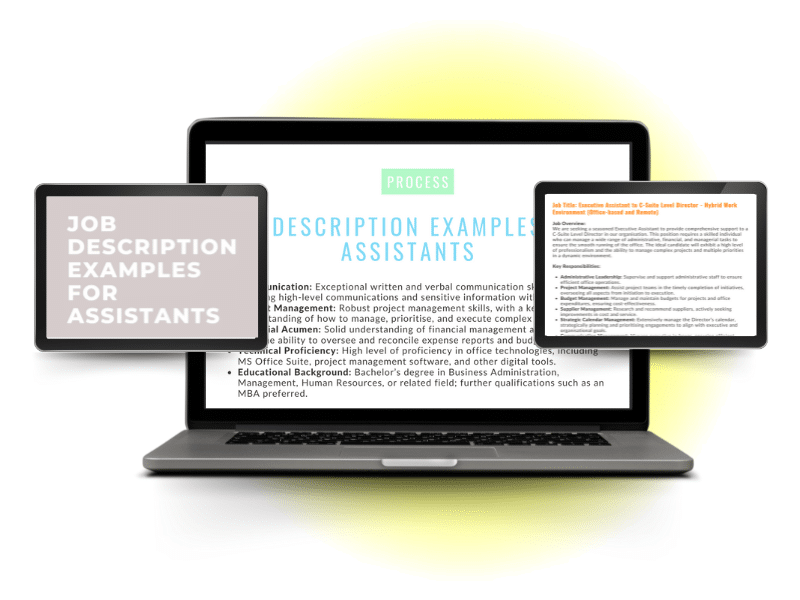The Ultimate Guide to Mastering Administrative Assistant Job Duties
Welcome to the ultimate guide to mastering Administrative Assistant job duties. This article will help you master every aspect of the Administrative Assistant role. Whether you’re new to this role or want to upskill, we’ve got you covered.
As an Administrative Assistant, it goes without saying that you are the backbone of any organisation, ensuring smooth operations and providing essential support to management and teams. But what exactly does this role entail?
This comprehensive guide will walk you through the essential responsibilities and skills required to excel in this role. We will cover everything from managing calendars, organising meetings, and handling correspondence to coordinating travel arrangements, maintaining files, and overseeing office operations.
We will provide you with practical tips and strategies and share insights from experienced administrative assistants that will help you navigate common challenges and enhance your productivity.
If you’re ready to sharpen your administrative skills, boost your efficiency, and become an invaluable asset to your organisation, let’s get started with what it takes to master the myriad of administrative assistant job duties.
Key Skills and Qualities Required for Administrative Assistants
As the Administrative Assistants role is so varied and can be pretty different from orgainsation to organisation or industry to industry, you need to possess diverse skills and qualities to thrive in this role.
Firstly, exceptional organisational abilities are crucial.
To handle the various responsibilities that come your way, you must be adept at multitasking, prioritising tasks, and managing time effectively. Attention to detail is also paramount; ensuring accuracy in tasks such as data entry, scheduling, and document management is critical.
Moreover, with any business support role, strong communication skills are essential for Administrative Assistants. You will be interacting with colleagues, clients, and stakeholders on a regular basis, so being able to convey information clearly and professionally is vital. This includes written communication, such as drafting emails and reports, and verbal communication when speaking with individuals in person or over the phone.
Communication is crucial for Administrative Assistants to focus on improving. Seek feedback to ensure you get it right. We tend to think that communication happens, but in reality, to be a clear and confident communicator, putting it at the forefront of your training needs and fine-tuning this skill will set you apart from other Admins in your organisation.
Adaptability is another valuable trait for Administrative Assistants. The ability to adjust to changing priorities, work styles, and environments is crucial in this dynamic role. Being flexible and open to new challenges will help you navigate unexpected situations and perform effectively in a fast-paced office setting.
Typical Administrative Assistant Job Duties
The day-to-day responsibilities of an Administrative Assistant can vary depending on the organisation and industry. However, some everyday duties include managing executives’ calendars, scheduling meetings, and coordinating travel arrangements. Additionally, Administrative Assistants are often responsible for answering phone calls, responding to emails, and handling correspondence. Quite often, you will find an Administrative Assistant works with the Executive Assistant to provide administrative support, while the Executive Assistant focuses on more strategic initiatives or works more closely with the Executive.
Another critical aspect of the role is maintaining office supplies and equipment, ensuring the office runs smoothly and efficiently. Administrative Assistants may also be involved in organising and storing documents, both physically and digitally, to facilitate easy access and retrieval when needed. This is crucial for mastering Administrative Assistant job duties.
Overseeing office operations and ensuring that administrative processes are streamlined are essential tasks for administrative assistants and can add tremendous value, especially in fast-paced environments where processes can often be last on people’s minds.
In addition to these core duties, administrative assistants may be called upon to assist with special projects, prepare reports and presentations, and liaise with other departments within the organisation. The role of an administrative assistant is diverse and requires a combination of skills to excel in various tasks.
Time Management and Organisational Skills for Administrative Assistants
Effective time management is crucial for Administrative Assistants to juggle multiple tasks and meet deadlines. There are many time management strategies that will help Administrative Assistants manage their tasks, but prioritising tasks based on urgency and importance is a must. Not everything you are asked to do is urgent or important, and working out the difference early in your career will help you enormously. Understanding the difference will help you allocate your time efficiently and ensure that key responsibilities are addressed promptly.
Tools such as calendars, to-do lists, and project management software can help organise tasks and track progress. You should use these tools for your time management and your Executive’s schedule.
Setting Goals
Setting realistic goals and breaking down complex tasks into manageable steps can enhance productivity and prevent feeling overwhelmed. It is also important to allocate time for unexpected interruptions or urgent requests while maintaining focus on completing ongoing projects.
Because you will be interrupted. A lot.
Developing a routine and establishing daily priorities can contribute to a structured approach to managing time effectively.
Staying Organised
Maintaining a clutter-free workspace and organising files systematically can save time and minimise distractions. By creating a well-structured filing system and keeping essential documents easily accessible, you can streamline your workflow and locate information promptly when needed.
Adopting time management strategies tailored to your workflow can boost efficiency and productivity as an administrative assistant.
Effective Communication and Interpersonal Skills
As we’ve already said, strong communication and interpersonal skills are essential for Administrative Assistants to effectively interact with Executives, colleagues, clients, and external stakeholders.
Clear and concise communication, whether written or verbal, is key to conveying information accurately and ensuring that messages are understood. Active listening is equally important in understanding others’ needs and responding appropriately.
Building rapport and maintaining professional relationships with individuals across different levels of the organisation can enhance collaboration and teamwork. Demonstrating empathy, patience, and diplomacy in your interactions can foster positive working relationships and create a supportive work environment. Being approachable and responsive to inquiries or requests can also help build trust and credibility.
Effective communication extends to written correspondence, where attention to detail, grammar, and tone is crucial. If you are new to the Administrative Assistant role, concentrating on this area in your first few months will take you a long way in your career.
Presenting information professionally and polishedly reflects positively on your communication skills and attention to quality.
Whether drafting emails, reports, or memos, ensuring clarity and conciseness in your written communication is essential for effective workplace interactions.
Technology and Software Proficiency for Administrative Assistants
In today’s digital age, Administrative Assistants need to be proficient in utilising various technologies and software to enhance productivity and streamline tasks. Advanced proficiency in common office software such as Microsoft Office Suite (Word, Excel, PowerPoint) is essential for creating documents, spreadsheets, and presentations.
It goes beyond Microsoft products, though. Familiarity with email management tools, calendar applications, and project management software will help you stay organised and manage tasks efficiently.
Learning to use communication platforms and video conferencing tools is also valuable for virtual collaboration and remote work arrangements. It is essential that you keep abreast of technological advancements and adopt new tools that improve workflow, which can boost your effectiveness as an Administrative Assistant.
Lastly, knowledge of database management systems, document-sharing platforms, and cloud storage solutions can facilitate information retrieval and collaboration within teams.
Being resourceful in navigating technology and troubleshooting common issues can save time and prevent disruptions in your daily tasks. It will help you build a reputation for being tech-savvy and able to help those around you who are not so knowledgeable in this area. In other words, you can add a ton of value here.
Embracing digital tools and software as a part of your skill set can enhance your performance as an Administrative Assistant.
Handling Confidential Information and Maintaining Professionalism
As an Administrative Assistant, you will have access to sensitive and confidential information that always requires discretion and professionalism. Safeguarding confidential data in physical and digital formats is paramount to maintaining trust and upholding ethical standards in the workplace. Adhering to privacy policies and security protocols is essential to prevent data breaches and protect sensitive information.
It is crucial for Administrative Assistants to exercise good judgment and integrity in handling confidential matters. This demonstrates your reliability and commitment to upholding confidentiality. Discussing sensitive information in public areas and properly securing confidential documents are essential to prevent unauthorised access. Respecting boundaries and maintaining confidentiality builds credibility and trust in your role as an administrative assistant.
It goes beyond handling confident documents, though. It is also paramount that you maintain professionalism in your interactions with colleagues, clients, and stakeholders. This is key to projecting a positive image of the organisation, your Executive, and your role in the team.
Upholding high ethical standards, displaying courtesy and respect, and adhering to professional conduct contribute to a harmonious work environment and will make your role much easier to manage.
Demonstrating accountability and integrity in your actions reinforces your professionalism and enhances your reputation as an Administrative Assistant.
Problem-Solving and Critical Thinking in the Administrative Role
Problem-solving and critical thinking skills are valuable assets for Administrative Assistants when faced with challenges or unexpected situations, which will happen frequently in this role.
Navigating complex tasks and overcoming obstacles in the Admin role is much easier when you can analyse problems, identify their root causes, and propose practical solutions.
Critical thinking is a crucial component in this process. It allows you to evaluate information accurately, make well-informed decisions, and anticipate potential problems before they arise. These are big concepts, but simply being aware of the issues faced by your Executive or your team and thinking about how to solve those problems will really help you stand out in your organisation.
You can make well-informed and proactive choices by considering different perspectives, weighing your options, and assessing risks. As I’ve said a million times, being proactive in the Administrative Assistant role is fundamental to your success.
Embracing a solution-oriented mindset and resourcefulness in seeking alternatives can significantly enhance your problem-solving capabilities.
Collaboration is another vital element.
As I often say, working collaboratively is essential for Assistants. Engaging with colleagues, seeking their input, and leveraging diverse perspectives can enrich your problem-solving process. It’s incredible how this can often lead to innovative solutions that you might not have considered on your own. Remember, two heads are better than one!
Continuous learning and professional development are also crucial. They broaden your skills and make you more adaptable to whatever changes come your way. It’s like adding more tools to your toolbox – you’re always prepared for the next challenge.
Cultivating a proactive and analytical approach to problem-solving empowers you to tackle challenges head-on in your administrative role. This mindset not only sharpens your problem-solving abilities but also ensures you’re ready for anything that comes your way. Embrace this approach, and you’ll find yourself not just surviving but thriving in your role.
Tips for Mastering Administrative Assistant Job Duties
To excel in your role as an administrative assistant, consider implementing the following tips:
- Stay organised: Maintain a structured approach to managing tasks and documents to enhance efficiency.
- Prioritise effectively: Identify key responsibilities and urgent tasks to allocate your time wisely.
- Communicate clearly: Ensure your messages are concise, accurate, and professional to facilitate effective interactions.
- Embrace technology: Leverage digital tools and software to streamline tasks and improve productivity.
- Seek feedback: Request input from colleagues and supervisors to enhance your performance and skills.
- Develop professionally: Pursue training opportunities, certifications, and skill development to stay current.
- Stay adaptable: To thrive in the administrative role, you must be open to change, new challenges, and continuous improvement.
Incorporating these tips into your daily routine and mindset can enhance your effectiveness, productivity, and job satisfaction as an administrative assistant.
Mastering the critical duties of the role requires a combination of skills, mindset, and continuous learning to excel in this dynamic and essential position.
In conclusion, mastering administrative assistant duties involves developing a diverse skill set, embracing technology, honing communication skills, and cultivating a problem-solving mindset. By prioritising organisation, professionalism, and continuous improvement, you can excel in this pivotal role and become an invaluable asset to your organisation.
To further enhance your skills and advance your career as an administrative assistant, consider seeking mentorship, networking with peers in the field, and pursuing professional development opportunities. By staying proactive, adaptable, and committed to excellence, you can navigate challenges, seize opportunities, and thrive in the administrative assistant role.
Remember, as an administrative assistant, you play a crucial role in supporting the overall success of your organisation. By mastering key duties, honing essential skills, and embodying professionalism, you can elevate your performance, contribute meaningfully to your team, and succeed in your administrative career.
If you would like to develop your administrative skills or move into an Executive or Personal Assistant role, consider taking our Assistant Essentials Online Course. It covers everything you need to know to excel in the Assistant role.





